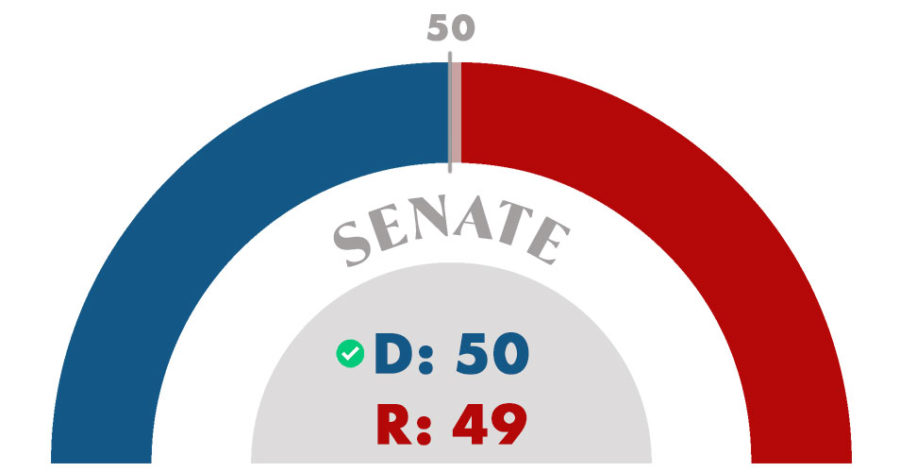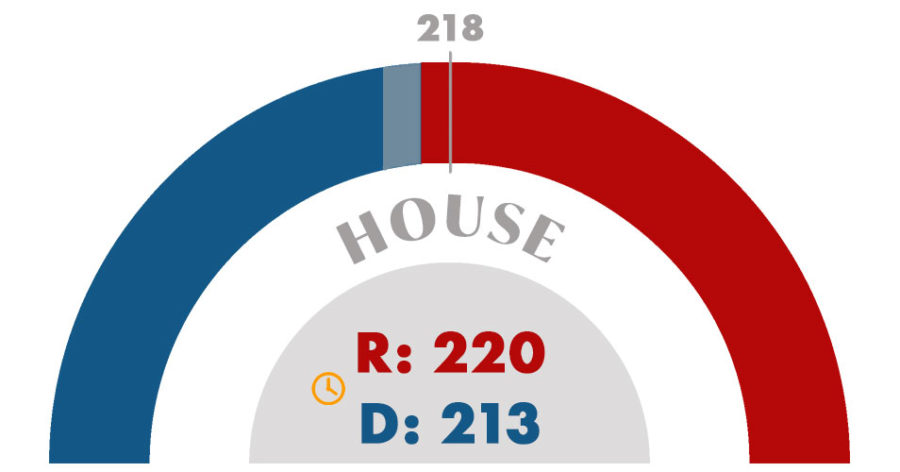Takeaways From the 2022 Midterm Election

The people have spoken, but now what?
In the weeks and days leading up to the 2022 Midterm Election, many were expecting a “red wave” to take over the state and federal governments. Forecasts showed Republicans taking control of both chambers of congress at the federal level, and historically the president’s party doesn’t tend to do well in midterm elections (in this case, Democrats). But, after the election, as winners were being declared across the country, it became clear that the tides, if you will, had changed a bit.
Looking at election results as a whole, it’s clear that Republicans did not perform nearly as well as anticipated. This is not to say the party failed, because some states truly did experience the red wave—but there were also quite a few that surprised us all with the opposite (looking at you, Michigan).
But, red, blue, purple … what do these results mean for us as parents? What kind of change, if any, can we expect to see in the next two years before we go through another election season? Here are some key takeaways from this year’s midterm.
A Divided Congress
Arguably, the biggest election surprise came at the federal level. While, as of today, there are still a few races to be called and a pending runoff election in Georgia, we know for sure that the Democrats managed to hang on to their slim majority in the U.S. Senate, and Republicans took over control of the U.S. House of Representatives with an equally slim majority. This means we have a divided congress, which will make passing more controversial family legislation all the more difficult, like codifying Roe v. Wade, reimplementing the expanded child tax credit, and passing any kind of paid family leave program.
US Senate
Currently, the Democrats have secured 50 seats in the Senate (including two Independents who vote with the party), and the Republicans have secured 49 seats. Already, this gives Democrats control of the Senate, because any 50/50 split vote gets a tie-breaker vote from Vice President Harris, who will vote with her party (Democratic).
That being said, the Senate race isn’t over and we don’t yet know if the breakdown will be 50/50 or 51/49 because there will be a runoff election in Georgia on Tuesday, Dec. 6 to determine whether incumbent Democrat Raphael Warnock or Republican challenger Herschel Walker will hold the senate seat. While it may not seem like this seat could make a big difference, it actually carries a lot of weight. If Warnock wins, that will make it easier for Democrats to push their agenda forward without one person holding up the process, much like Joe Manchin did over the last two years. (We can thank him specifically for letting the expanded child tax credit expire after 2021.)
Additionally, because of the silent filibuster in the Senate, Democrats have to get 60 votes to pass most bills. With Warnock voted in, they’d only need to sway nine senators on the other side, as opposed to 10 if Walker wins the seat.
US House of Representatives
Regardless of who wins the Georgia runoff election, we should all be prepared for a lot of stalemates over the next two years. For a bill to make it to President Joe Biden’s desk for signature, it has to pass through both the Senate and the House of Representatives, and control of the House has flipped from Democrat to Republican. A party needs to hold at least 218 of 435 seats to win the majority, and as of today, Republicans have 220 and Democrats have 213. The House races for the two remaining seats have not been officially called, but are likely to go to the Republican party.
Again, we are working with a very slim majority, and unlike the Senate, the House of Representatives does not have a filibuster rule, so a simple majority is all that is needed to pass a bill through the chamber. Because we can’t have nice things, the Speaker of the House (or the House majority leader) decides what bills make it to the floor for a vote—which means even if Democrats are able to sway a handful of Republicans to vote for one of their more controversial bills, such as health care reform or common sense gun laws, it’s unlikely to make it past the Speaker’s desk onto the floor.
Summary
What can we expect out of our U.S. Congress lawmakers over the next two years? Very little when it comes to reforming or establishing laws that help families. We will likely see the Senate continue to confirm Federal Judges across the country, but beyond that, the bills that make it to the President’s desk to be signed into law will be regarding things our very divided congress can agree on (which usually isn’t much when it comes to everyday help for the people, unfortunately).
Results at the State Level
While the big sweeping laws come from the federal government, many of the things that impact our daily lives as parents happen at the state level. For instance, while we can’t expect a federal paid family leave program over the next two years, states still have the ability to pass something for their citizens. And public schools are primarily governed at the state level, so the party that controls congress in each state will have a lot of say in our kids’ educational experiences.
Notable state election results
Both Gov. Ron DeSantis of Florida and Gov. Greg Abbott of Texas were reelected this year. While Florida and Texas are notoriously red states, Abbott faced a lot of heat after the tragic mass shooting at an elementary school in Uvalde, Texas earlier this year, and DeSantis passed two very controversial bills, one that was dubbed the “Don’t Say Gay” bill and the other banning Critical Race Theory in schools.
Michigan got a lot of attention this election as well, with record voter turnout and a blue wave that took over the government, with Democrats winning the Governor, Secretary of State, and Attorney General races as well as taking control over the state Senate and House of Representatives.
Additionally, across the country, we saw the vast majority of “election denier” candidates lose their races. After watching the Jan. 6, 2021 insurrection unfold due to baseless claims of a “stolen election,” many Americans were left holding their breath this election, as so many election deniers won their primaries and were on midterm ballots. Thankfully, for the most part, the people rejected these candidates, hopefully paving the way for a stronger democracy—for ourselves and our children—moving forward.
Reproductive rights
If there was a clear winner in this election, it wasn’t a party—it was abortion rights. In June, the Supreme Court of the United States (SCOTUS) decided to overturn the precedent set by Roe v. Wade, giving the power of legalizing (or criminalizing) abortion to the states. It has been chaos ever since, and even many of those who were fiercely pro-life before this ruling have found themselves horrified by the realities of taking away this important right to reproductive health care. Because the truth is, regardless of whether or not you agree that a woman should have the right to make decisions about her own body and her future, sometimes deciding to terminate a pregnancy is a matter of life or death—and that decision can be absolutely devastating for excited parents-to-be.
Many analyses claim the SCOTUS ruling is the force that stopped the red wave in this election. Voters in notoriously red states showed up in droves to protect this critical right. People in Kentucky voted against a proposal that would further restrict reproductive rights, and voters in Montana rejected a proposal to criminalize health care providers who performed abortions. Additionally, abortion is now protected in Vermont, California, and Michigan thanks to voters in the 2022 elections.
Diversity and representation
After all of the hateful bills presented (and passed!) over the last few years, many parents of children in underrepresented groups have had to contemplate moving their families across states to where they will be accepted. It’s been disheartening, and the only way to make positive change for these groups is through representation in the government.
Fortunately, we saw a positive shift in diversity and representation across the country this election. History was certainly made and people from underrepresented groups won races nationwide, from state legislatures to governor seats to U.S. congress. Some notable winners and firsts include:
- Maura Healey (MA) and Tina Kotek (OR) are the first openly lesbian governors in the U.S.
- Wes Moore is Maryland’s first Black governor (and only the third Black governor in U.S. history)
- James Roesener (NH) is the first out trans man to win a state legislature race in America
- Becca Balint is the first woman and first openly LGBTQI+ person to represent Vermont in the U.S. House of Representatives
- Sarah Huckabee Sanders is the first female governor of Arkansas
- Arkansas and Massachusetts became the first states to elect women for both governor and lieutenant governor at the same time
- Maxwell Alejandro Frost (FL) is the first Gen Z member of congress
- Aruna Miller is Maryland’s first Indian American lieutenant governor
- Delia Ramirez is the first Hispanic woman elected to congress from Illinois
- Robert Garcia (CA) is the first openly gay immigrant elected into congress
- Summer Lee is the first Black woman representing Pennsylvania in congress
- Anthony Brown is Maryland’s first Black state Attorney General
- Eric Sorensen is Illinois’ first LGTBQI+ member of congress
- Zooey Zephyr is the first transgender state legislator in Montana
- Katie Britt is Alabama’s first woman senator
- Kathy Hochul is New York’s first female governor
- Erick Russell is Connecticut’s first openly gay Black person to be elected into a statewide executive office
- Andrea Campbell is the first Black woman to be elected into a statewide executive office in Massachusetts
- Leigh Finke is the first transgender person elected into the state legislature in Minnesota
Given all of the upsets and tight races in this election, it’s clear that every vote matters. We all may feel apathetic towards politics from time to time, but each of us holds power and our voices can drive change. So, while we wait another two years before we have to go through all of this again (well, except for y’all in Georgia), let’s continue to advocate for our kids and families by contacting our representatives, showing up to local assemblies, and closely following the issues that mean the most to us. It’s up to us to decide the kind of country we want to leave behind for our children, and our work is far from over.










